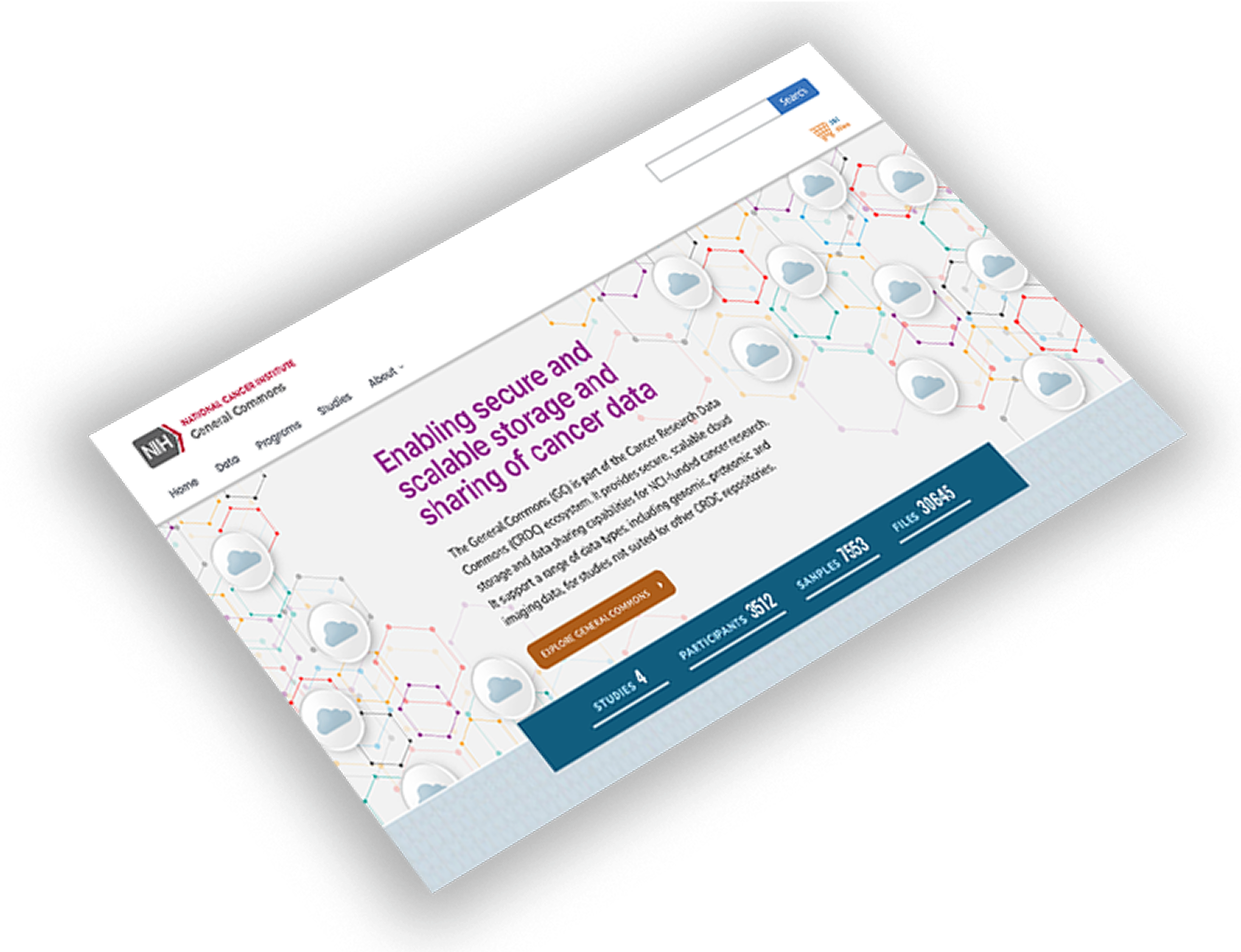Overview
The General Commons (GC) is one of several data commons within the Cancer Research Data Commons (CRDC) eco-system.
The GC provides secure storage and data sharing capabilities for NCI-funded cancer data on the cloud for studies that fall under the following categories:
• Studies with data that do not match any existing CRDC Data Commons (Genomic Data Commons, Proteomic Data Commons, Genomic Data Commons, Imaging Data Commons, Clinical and Translational Data Commons)
• Studies with data that do not fit current data type criteria and/or the metadata requirements for any CRDC Data Commons
The GC is home to a combination of open and controlled access data. The GC portal is accessible to all users for searching through data submitted to the GC across all studies. This does not require a login and allows users to check if the GC has data of interest before going through the process of requesting access to controlled access data through the NCBI’s dbGaP system. Open access data is publicly accessible; it does not require any approvals.
Data Types
The GC currently contains mainly genomic and imaging data, and some proteomic data, but is open to accepting multiple data types.
Data Submission
The GC is integrated into the CRDC Data Submission portal, and therefore, submissions to the GC have to be made through that portal.
Information about the data submission process and links to instructions can be found on the CRDC Submit Data page.
Submitters start the process by submitting the Data Submission Request found on the CRDC Submission Portal. The request will be reviewed by the CRDC’s Submission Review Committee (SRC) and will go through an approval process. Once the request is approved, data can be submitted.
Contact the CRDC Help Desk for information and support.
Data Access
The GC hosts controlled access data, which means users need to obtain authorization from the NCI’s Data Access Committee (DAC) to access and use the data. The authorization process is implemented and managed by the Database for Genotypes and Phenotypes (dbGaP) maintained by the National Center for Biotechnology Information (NCBI). Users should request access to controlled access data through dbGaP.
The GC also hosts open-access data that are publicly accessible; no authorization is required.
Learn more about searching GC data through the portal’s Analysis and Accessing Data section, which provides a step-by-step guide for searching using various parameters, including Study, Experimental Strategy, Sex, Tumor, and File Type.
The GC data is made accessible through one of the NCI Cloud Resources, the Seven Bridges Cancer Genomics Cloud, powered by Velsera (SB-CGC).
Data Analysis
Within the GC portal, researchers can build cohorts of subjects and samples and a data manifest for those cohorts or can directly export their data to the NCI-cloud resource, Seven Bridges Cancer Genomics Cloud, powered by Velsera (SB-CGC). SB-CGC collaborates with the GC in making data accessible for analysis and provides publicly available analytical tools in secure personal workspaces in the AWS cloud environment. Learn more.
Datasets
Links are provided for the studies released on dbGaP and data access is available on SB-CGC
- Childhood Cancer Data Initiative (CCDI): Genomic Analysis in Pediatric Malignancies - phs002430.v1.p1
- DCCPS CIDR: The Role of Rare Coding Variation in Prostate Cancer in Men of African Ancestry - RESPOND Project 2 – phs002637.v1.p1
- CCDI: MCI - Molecular Characterization Initiative – phs002790.v7.p1
- TCGA WGS Variants Across 18 Cancer Types - phs003155.v1.p1
- CCDI: NCI CCSG CCDI Supplement Additional Genomic Submission - phs002599.v1.p1
- LCCC 1108: Development of a Tumor Molecular Analyses Program and Its Use to Support Treatment Decisions (UNCseqTM) - phs001713.v1.p1
- CPTAC Proteogenomic Study – phs001287.v17.p6
- DCCPS CIDR: The Genetic Basis of Aggressive Prostate Cancer: The Role of Rare Variation - phs001524.v3.p2
- CIDR: Discovery, Biology, and Risk of Inherited Variants in Glioma - phs002250.v1.p1
- Detection of Colorectal Cancer Susceptibility Loci Using Genome-Wide Sequencing - phs001554.v1.p1
- Discovery of colorectal cancer susceptibility genes in high-risk families - phs001787.v1.p1
- Prostate, Lung, Colorectal and Ovarian Cancer Screening Trial - phs002011.v1.p1
- Whole genome sequencing to discover familial myeloma risk genes - phs001819.v2.p1
- Molecular Pathological Epidemiology of Colorectal Cancer - phs002050.v2.p1
- Human Tumor Atlas Network - phs002371.v7.p2
- Human Tumor Atlas Network Imaging- phs002371_image
- NCI UCSF CCDI Database for the Advancement of JMML - Integration of Metadata with "Omic" Data - phs002504.v1.p1
- CCDI Free the Data: Open Sharing of Comprehensive Genomic Childhood Cancer Datasets (Kansas) - phs002529.v1.p1
- Childhood Cancer Data Initiative (CCDI): OncoKids - NGS Panel for Pediatric Malignancies - phs002518.v1.p1
- Wistar PDX Development and Trial Center - phs002432.v1.p1
- Washington University PDX Development and Trial Center - phs002305.v1.p1
- University of Texas PDX Development and Trial Center Grant - phs001980.v2.p1
- Childhood Cancer Data Initiative (CCDI): Molecular Characterization across Pediatric Brain Tumors and Other Solid and Hematologic Malignancies for Research, Diagnostic, and Precision Medicine - phs002517.v2.p2
- HCI – PDX Trial Center for Breast Cancer Therapy - phs002479.v1.p1
- Pediatric Preclinical Testing Consortium (PPTC) PDX Data Models - phs001437.v2.p1
- CCDI Pediatric In Vivo Testing Program – Leukemia – phs003164.v1.p1
- Childhood Cancer Data Initiative (CCDI): Enhancement of Data Sharing in Pediatric, Adolescent and Young Adult Cancers – phs002431.v1.p1
- CCDI: Integrating Longitudinal Clinical, Sociodemographic and Genomic Data into the NCCR – phs002677.v1.p1
- Lung Cancer Genetic Study among Asian Never Smokers – phs002366.v2.p2
- Molecular Pathological Epidemiology of CRC – phs001905.v1.p1
- MP2PRT: Genomic and Molecular Characterization of Biomarkers Associated with Tumor Angiogenesis, DNA Repair, and Immunologic Tolerance using Samples from the NRG Oncology Phase 3 Randomized Trial, GOG-0240 - phs002293.v1.p1
- Childhood Cancer Data Initiative (CCDI): Identification and Targeting of Treatment Resistant Progenitor Populations in T-cell Acute Lymphoblastic Leukemia - phs003432.v1.p1
Anatomical Sites
The GC has data on the following tumors:
- Bone
- Brain
- Breast
- Colorectal
- Lung
- Ovarian
- Prostate
